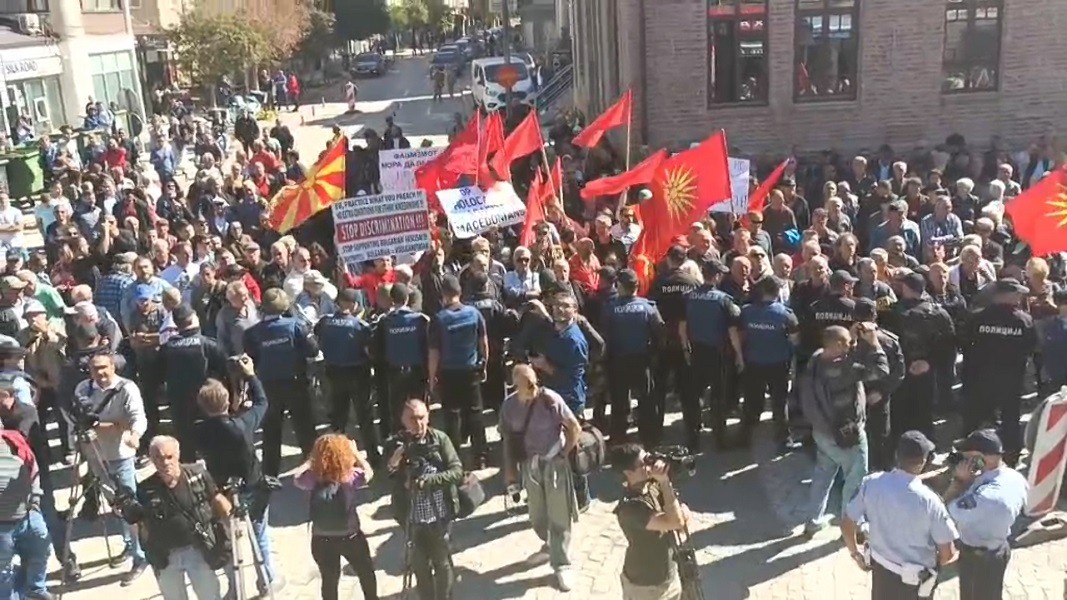The club of the Bulgarian cultural association, officially registered a year ago and bearing the name of Tsar Boris III, was opened in Ohrid, as the atmosphere during the event was tense. During the ceremony, which was guarded by the police, a hundred representatives of the opposition parties "Levitsa" and VMRO-DPMNE protested with anti-Bulgarian posters, chanting that Tsar Boris III was a "fascist" and that the Bulgarians were "Tatars", media in North Macedonia reported. Minutes after the event, the chairman of the association, Tome Blazeski, had an interview with Radio Bulgaria.

"There has been a lot of pressure against us. People had been threatened before and it happened now, too. It was a tense atmosphere, but it went more or less without many problems. There were attempts for throwing eggs and tomatoes, things like that, but it all went well."

And who were the guests from Bulgaria at the opening?
"There were politicians from different parties. The ambassador of the Republic of Bulgaria in North Macedonia, Angel Angelov, the consuls from Skopje and Bitola, Mr. Milen Vrabevski and other businessmen were also present.”
Everyone asks the question: why did you choose the name of Tsar Boris III when you registered the association a year ago?
"Because he is the king of all the Bulgarians and is something that connects the Macedonian Bulgarians with the Bulgarians on the other side of the border. Our association focuses on cultural activities related to Bulgarian culture."

Are there still people in the city of Ohrid who remember who mayor Iliya Kotsarev was and his role in saving the city during the World War II?
"As we can see, most do not remember. Those who have Bulgarian identity know this, the others do not. We should have some kind of commemoration in the future; some kind of event in honor of his name. We'll see what time will bring."
Iliya Kotsarev was voivode during the Ilinden-Preobrazhenie Uprising. He emigrated to the Kingdom of Bulgaria and worked in the Bulgarian Ministry of Foreign Affairs. When, in 1941 during World War II, Ohrid was included in the Italian occupation zone, Kotsarev appealed to Tsar Boris III to intervene. The city was returned to the Bulgarian occupation zone. Iliya Kotsarev was elected mayor by the population. During the war, he took care of all the people of Ohrid, regardless of their political views. On October 13, 1944, 25 Bulgarian prisoners of war hid in the city. The Nazis threatened to burn down Ohrid if they were not handed over. At the request of the mayor Kotsarev, Captain Meyer Baumgarten agreed that every prisoner will be ransomed for half a kilogram of gold. The next day the population donated all their gold. Baumgarten was so touched by this that he kept just one gold ring as a memento. The collected gold was returned to the mayor, who after a few days handed it over to the partisans. After that, the traces of the gold are lost.
English: Alexander Markov
Photos: BGNES, personal library, PixabayThe Kukeri Festival in Shiroka Laka, traditionally held on the first Sunday of March, marks the end of winter and the beginning of spring. Accompanied by the sound of bells and cowbells, a ritual is performed to ward off evil. On this day local..
A sports festival for children and youth with special needs will be held today in the square in front of the Ruse Municipality building , the local association "Parents of Children and Adults with Autism" announced. The event is..
The “Kladi” ritual, dedicated to the Cheesefare Sunday, will take place for the 32nd consecutive year on the meadow in front of the “Kulata” ethnographic complex in Kazanlak, the organizers from the “Zhar 2002” Community Center..
The Kukeri Festival in Shiroka Laka, traditionally held on the first Sunday of March, marks the end of winter and the beginning of spring. Accompanied by..
A sports festival for children and youth with special needs will be held today in the square in front of the Ruse Municipality..
The “Kladi” ritual, dedicated to the Cheesefare Sunday, will take place for the 32nd consecutive year on the meadow in front of the..

+359 2 9336 661
